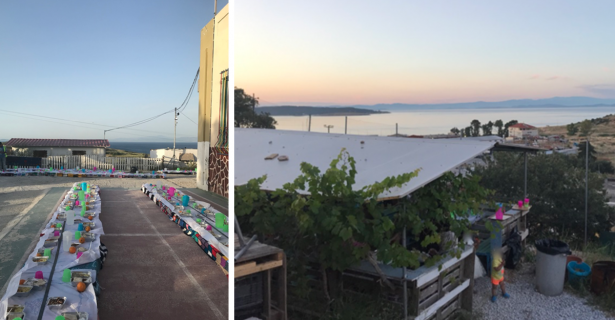For the past month, I have been volunteering at One Happy Family Community Centre (OHF), in Lesvos, Greece. OHF, a Swiss non-profit, was founded in 2017 in response to the effects of the EU-Turkey deal, which resulted in thousands of refugees being stuck on Lesvos for prolonged periods of time, rather than being registered and moved to Athens to continue the asylum process. OHF is a community center and a hub for several different NGOs that provide different activities and services to the refugee community. OHF’s aim is to “give a piece of dignity and self-determination back to the thousands of people which are stuck on Lesvos.” The center can get close to 1,000 visitors a day, people who might be attending language or media production classes, getting a haircut, visiting the medical clinic, attending workshops in the low-tech maker-space, or just getting a coffee and playing cards (the list goes on).
A key tenet of OHF is that the center is “not being built and run for the people, but with them,” and throughout my time here I have been incredibly impressed by how strongly this vision is manifested, and by the strength of the relationships formed among incredibly diverse groups of people (age, language, background, etc.). About 75 people work to make OHF run smoothly every day, and of that 75, 60 are people currently in the asylum process. The projects are based on the requests and initiatives of refugees and sustained by their work and commitment. Volunteers largely fill in the gaps and provide support; my primary responsibilities are teaching English and assisting the school directors with coordination, but my daily schedule will also include various other tasks, such as helping to serve lunch or register visitors. During the first couple of weeks here, I spent several evenings helping to make salad for 600-- I arrived here about ten days before the end of Ramadan, during which OHF hosted two iftars (break-fasts) a week. The iftars were a fantastic time to experience the community of OHF—during both the frenzied but efficient preparation and the meal itself.
A few months ago, at the end of an EPIIC class, we watched 4.1 Miles, a short documentary about a Greek coast guard captain working off the coast of Lesvos, a Greek island 4.1miles from Turkey. Over the past years, hundreds of thousands of refugees have crossed this stretch of Mediterranean in often dangerously overcrowded, ill-maintained boasts in order to reach Europe. After watching 4.1 Miles in class, many of us discussed the impact of seeing footage from the journey itself, rather than just reading about political theories and EU border policy. I thought of the film when I landed on Lesvos and could see lights on the Turkish coast from the airport, and since then awareness of this 4.1-mile stretch has become part of my every day life.
The multifaceted nature of the sea as both a beautiful sight and cruel border is felt at OHF and in Lesvos in general. OHF is north of Mytilene, the capital of Lesvos, on a hill just up from the coast. Every evening I teach English to the helpers (refugee volunteers) after OHF closes, in a breezy spot with a lovely, sweeping view of the sea. Right next to the Kara Tepe camp and a few kilometers from the Moria camp, OHF is also just south of where seven migrants drowned right off the Greek coast a couple of weeks ago. Mytilene is centered around a port, where both old-school fishing boats and armored coast guard and border patrol ships constantly sit. I have sat next to new co-workers and friends as they tell me about their journey crossing that 4.1 miles, as we sit on the beach looking at Turkey after swimming in the same ocean. The presence of the sea provides a constant visual reminder of the journey taken to get here. While I learn from and become closer to people at OHF going through the asylum process, that 4.1 miles will always hold drastically different meanings for us. I can listen and try to understand people’s experiences to the best of my ability, but by the power given to me by my place of birth/passport that 4.1 miles is not a life-threatening border, but an easy 15-euro ferry ride away.

